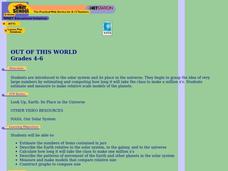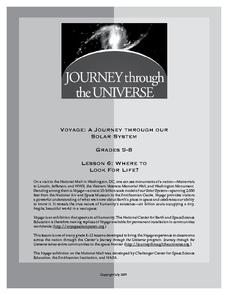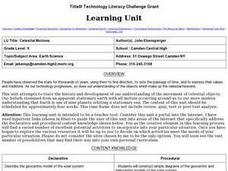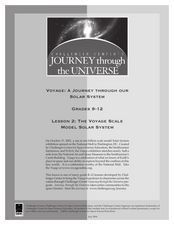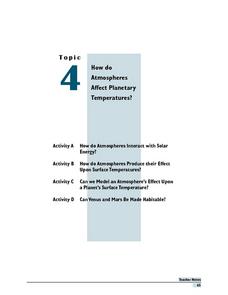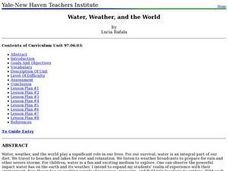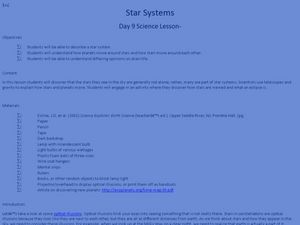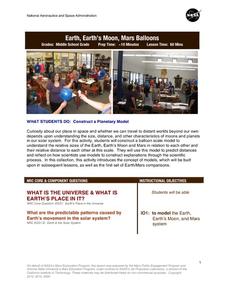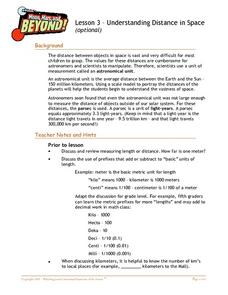Curated OER
Rolling Through Space
Seventh graders use a foll of toilet paper to visualize the vast distance that separates the sun and the planets of our solar system.
Curated OER
Extra Terrestial Excursions
Fourth graders determine how long it would take to fly to each of the planets in the solar system. They do two calculations: one, if they were using conventional jet, the other if they were using the fastest spacecraft possible.
Curated OER
What's "Out" There?
First graders investigate the five outer planets. In this space science lesson, 1st graders read the book Our Solar System and identify the five outer planets. Students create a booklet and write about outer planets.
Curated OER
Out of This World
Pupils are introduced to the solar system and its place in the universe. They begin to grasp the idea of very large numbers by estimating and computing how long it take the class to make a million x's.
Curated OER
Space, the Final Frontier...
Students study a common theory on how the solar system was formed and examine the relative scale of the size and distances among the bodies of the Solar System.
Journey Through the Universe
Where to Look For Life?
Every year we discover new planets including more than 1,000 in 2016 alone. Will we ever find life on another planet? The activity includes two activities to help scholars understand this concept. First, they analyze the temperature...
Curated OER
Glowing Glimpses of Our Universe
Students will complete hands-on space activities. In this space science lesson, students will create a glow-in-the-dark model of the solar system, visit a planetarium, make star pictures, and paint constellations. Activities are meant to...
Curated OER
Celestial Motions
Ninth graders complete a unit of lessons on the history of our knowledge of celestial objects. They conduct Internet research, plot the motion of a planet, construct a model of the sun's apparent motions, and create diagrams of the solar...
Curated OER
Attributes of Renewable Energy: From Nanopossibilities to Solar Power
Young scholars explore solar energy, why we use it and how we use it. In this renewable energy lesson students compare active and solar techniques.
Curated OER
The Voyage Scale
Students identify how models are powerful tools of exploration and that the sizes of the planets and distances between the planets in the Solar System span a large range. They make a sign for each planet they have created in the lesson...
Curated OER
How Do Atmospheres Affet Planetary Temperatures?
Students perform a literature search and use reputable research resources in order to find the surface temperature of different planets in our solar system. They speculate about the observed and unobserved factors. Then brainstorming is...
University of Colorado
Terra Bagga
Earth's magnetic poles switch positions about every 200,000—300,000 years. In the activity, groups create a planet with a magnetic field. Once made, they use a magnetometer to determine the orientation of the planet's magnetic field....
Curated OER
Water, Weather, and the World
Students in a special education classroom examine the role of weather and water in their lives. Each day, they add a symbol for the weather outside and identify the proper activities for the weather on that day. In groups, they...
Curated OER
Star Systems
Students study a star system and see how the planets move around stars. In this star system lesson students complete an activity and see what an eclipse is.
NASA
Earth, Earth’s Moon, Mars Balloons
Very specific diameters are given for blowing up three different balloons to represent, in scale, the moon, Earth, and Mars. In groups of three, amateur astronomers explore scale measurements and distance in space.
Curated OER
3D Textured Globe
The earth, our home planet, and the star of Earth Day celebrations everywhere! Celebrate Earth Day or examine Earth's place in the solar system, with a fun and easy craft, perfect for children nine and up. Paper mache ornaments, paint,...
Curated OER
Clay Planets
Students create scale models of the planets out of clay and compare them to the real planets.
Curated OER
Inner Planets
Students research characteristics of the planets and record their findings on Planet Web worksheet. They create fold paper to create a foldable booklet to display the information they discover about the planets.
Curated OER
Being Nosy About Our Neighbors
Students use the scientific method to explore the effect of size on impact cratering. They compare images of landforms on Earth to those of other planets to compare surface processes. Students infer the geologic history of another...
Curated OER
Understanding Distance in Space
Students discover the vocabulary used for distances in space and review measurement units and instruments before creating a scale model of the planets. They determine how to calculate the relative distances between the planets using a...
Curated OER
Earth
Fourth graders engage in a study of the solar system. The teacher constructs an outside model of it. They walk through it making constructive observations. Students conduct a class discussion about the solar system and planets. They...
Curated OER
Space: Stars and Planets
Pupils observe and report that the moon can be seen sometimes at night and sometimes during the day. They describe how changes to a model can help predict how the real thing can be altered. Students explain the essential fact of the...
Curated OER
Pioneers of Space
Students explore how to use natural resources in the next millenium. Students create a KWL chart and then research information on our solar systsem, natural resources, and environments. Students build a model of a future community and...
NASA
The Drake Equation
In this Drake Equation worksheet, students read about how scientists can estimate the number of intelligent civilizations that may exist in our galaxy. Students answer 7 questions about the Drake Equation and they use the internet to...



